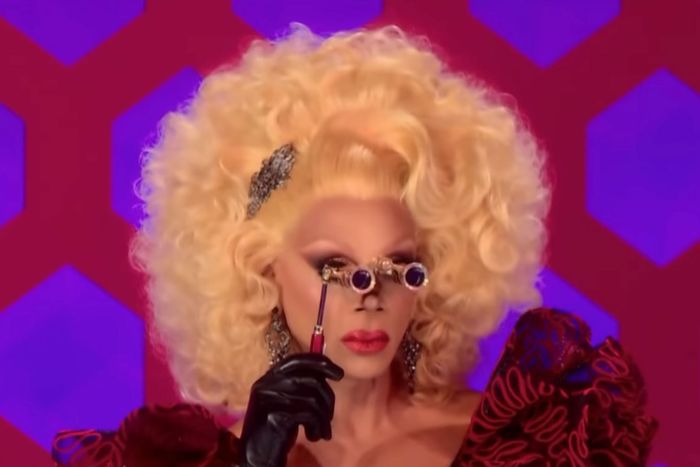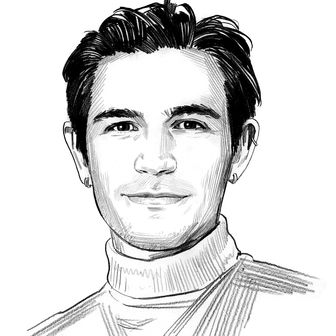
RuPaul’s new memoir, The House of Hidden Meanings, is not what fans of RuPaul’s Drag Race would expect. For one, the tone of the book is self-consciously serious. Instead of the humorous diva Ru we see on the show, he positions himself as a wizened elder who, with help from writer Sam Lansky (The Woman in Me), tells the saga of his life using clear messages and conclusions, and — despite many descriptions of laughter — few actual jokes. Instead, he focuses on the hardest moments of his life pre-fame, and, later, in the nascent stages of his fame — drug use, waywardness, family hardships, etc. The book, which came out Tuesday, March 5 (the same day as his … controversial book-selling enterprise), ends in the late-’90s-early/2000s, well before Drag Race even begins. Fenton Bailey and Randy Barbato, future executive producers of the show, make appearances, but as their group the Fabulous Pop-Tarts and later as Ru’s managers. No, this is not the story Ru “Creator and host of the most important queer TV program of maybe all-time” Paul.
Yet, true Drag Race fans know that Ru’s early life is a part of the show’s DNA — it is built upon Ru’s personal reference points. It’s a rookie mistake for new queens to not do their homework and know Ru’s go-to references; something a waitress said in front of him one time can become a multi-season joke that crops up each episode. Given The House of Hidden Meanings’ focus on Ru’s pre-drag days, it doubles as a sort of manual, introducing new fodder for future seasons of Drag Race. There are plenty of clues for young aspiring drag queens to latch on to about what Ru’s taste level. If you’re a future contestant, a hopeful, or just a fan looking to understand what’s happening on the show, here’s a guide to the most esoteric, yet formative, pop culture references in RuPaul’s memoir.
Random commercials
RuPaul loves a good, ultraglamorous commercial, specifically recalling, “Edie Adams vamping in a spot for Muriel Cigars in the style of Mae West.” He also remembers pretending to be in a commercial for Coty cosmetics in the mirror as a child: “Yes, It’s Coty.”
The one-season detective show Honey West (1965)
Notable for featuring a woman lead in Anne Francis as the titular honey, Ru loved Honey West’s pet ocelot and that “she didn’t play by society’s rules.” Francis did win an Emmy for the series, so Ru wasn’t the only one who liked it, even if it was promptly canceled.
That one episode of East Side West Side with a rat
Ru developed “a thing about rats” after watching an episode of the 1963–64 TV drama East Side West Side, which followed a social worker and his secretary, in which a baby gets bitten by rats. The fear was compounded by the fact that Ru saw himself in the rats, because they are “smart and sneaky.” There are many sentences in this book that are the first of their kind.
Divas
Important divas that Ru in some way impersonates, whether by lip syncing their tracks or simply emulating their work, over the course of this book include: Tina Turner, Carol Burnett, LaWanda Page as Aunt Esther on Sandford and Son, Diana Ross, Cher, Dolly Parton, Fern Kinney, Chéri, Whitney Houston, and Nicole McCloud.
The Partridge Family
“Love Love Love” on The Partridge Family inspired RuPaul’s infamous songwriting career. Ru may not be able to sing, but he began working on stage presence by forcing the kids in the neighborhood to perform after being inspired by TPF.
The Flip Wilson Show
Flip Wilson played a character named Geraldine on the 1970–74 series, which Ru describes as the first time he saw Black man transgress the gender binary, and was wildly popular. He even mentioned this performance again on The View on March 6, where most of the women nodded politely while Whoopi Goldberg made a knowing face that said “Duh.”
Cleopatra Jones
The blaxploitation film Cleopatra Jones, starring Tamara Dobson as the titular crime fighting icon, inspired Ru with its power and style. “Cleopatra Jones was who I wanted to be,” Ru writes. “When you can understand your secret girl, she can be useful to you.”
Sylvester
Sylvester, the disco artist known for playing with gender, being a queer renegade, and making great music, pops up a lot. “And I knew, even as a teenager,” Ru says when he hears his sister talk about Sylvester for the first time, “that it was important.”
“Convoy,” by C.W. McCall
This is mostly just a song that became a number one hit around when Ru learned to drive — but he loved it!
“Because the Night,” Patti Smith
RuPaul’s first band performed “Because the Night” because Ru decided they must. His mom gave him the money for the album (after much cajoling), because she believed in Ru’s stardom.
David Bowie in general
Driving music is big for Ru, and Scary Monsters was on repeat in his car. He describes checking into “one of the loveliest hotels I’ve ever been in” (a motel in Wilcox) to watch Bowie’s 1980 interview on 20/20.
Monty Python
Ru loves comedy troupe Monty Python because of “their willingness to poke fun at gender, politics, and religion.”
The B-52s
Ru notes that there were two Atlanta bands from Atlanta who made it big in the ’80s: R.E.M., who he calls “the equivalent of a human sob,” and the B-52s, whom he liked. Ru later appeared in the music video for “Love Shack,” and the band appeared on Drag Race to judge the cheerleading challenge that injured Eureka.
The television movie Trilogy of Terror
In which Karen Black is “terrorized by a Zuni fetish doll.” Ru loved the movie so much, he created his own version in which he was the statue and wore a wig for the first time.
She’s So Unusual, by Cyndi Lauper
Ru and her friends found a copy of this album in a burned down home and listened to her version of Prince’s “When You Were Mine” on repeat.
“When Doves Cry,” by Prince
This was, during Spring 1984, playing at either Ru or his friend’s apartment at all times.
“Freedom! ’90,” by George Michael
Yes, RuPaul was in the audience when the four biggest supermodels of all time walked the Versace runway to this song, well before he was properly famous. How could he not have been?
Miami Vice
RuPaul, like many others, credits Miami Vice for revitalizing Miami, where he eventually got a condo with his partner Georges. “Renovating this condo in Miami,” Ru thought, “Would be an ideal project for Georges,” since he’d quit his job. During this time, however, George became addicted to crystal meth, so the lights didn’t work and one wall was covered head-to-toe with mirrors — a literal house of hidden meanings.


